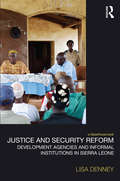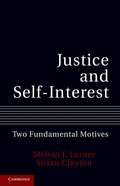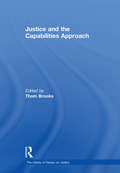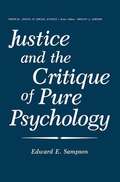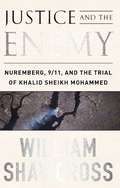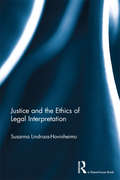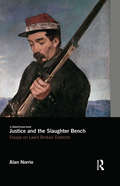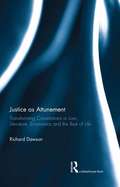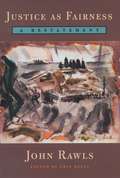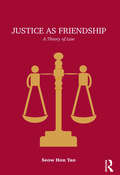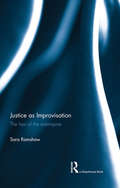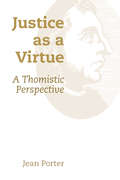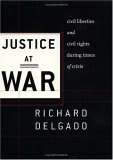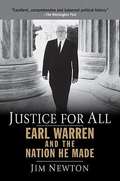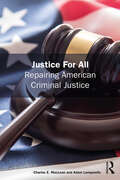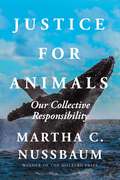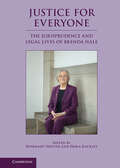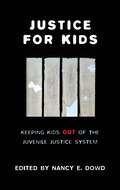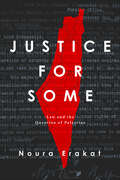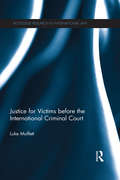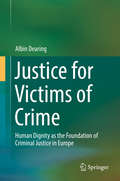- Table View
- List View
Justice and Security Reform: Development Agencies and Informal Institutions in Sierra Leone (Law, Development and Globalization)
by Lisa DenneyJustice and Security Reform: Development Agencies and Informal Institutions in Sierra Leone undertakes a deep contextual analysis of the reform of the country’s security and justice sectors since the end of the civil war in 2002. Arguing that the political and bureaucratic nature of development agencies leads to a lack of engagement with informal institutions, this book examines the challenges of sustainably transforming security and justice in fragile states. Through the analysis of a post-conflict context often held up as an example of successful peacebuilding, Lisa Denney reveals how the politics of development agencies is an often forgotten constraint in security and justice reform and development efforts more broadly. Particularly suited to upper-level undergraduates and postgraduate students, as well as practitioners, this book is relevant to those interested in security and justice reform and statebuilding, as well Sierra Leone’s post-conflict recovery.
Justice and Self-Interest
by Melvin J. Lerner Susan ClaytonThis volume argues that the commitment to justice is a fundamental motive and that, although it is typically portrayed as serving self-interest, it sometimes takes priority over self-interest. To make this case, the authors discuss the way justice emerges as a personal contract in children's development; review a wide range of research studying the influences of the justice motive on evaluative, emotional and behavioral responses; and detail common experiences that illustrate the impact of the justice motive. Through an extensive critique of the research on which some alternative models of justice are based, the authors present a model that describes the ways in which motives of justice and self-interest are integrated in people's lives. They close with a discussion of some positive and negative consequences of the commitment to justice.
Justice and the Capabilities Approach (The Library of Essays on Justice)
by Thom BrooksThe capabilities approach is a widely influential alternative theory of justice, popularized by Nobel Prize winner Amartya Sen and also by Martha Nussbaum. Justice and the Capabilities Approach is the first work of its kind to publish in one place the most influential essays in the field covering a number of topics, including constitutional law, cosmopolitanism, distributive justice, the family, feminism, global justice, human rights, poverty, and social justice. The collection should help inform both scholars and students coming to the study of the capabilities approach for the first time of both the importance and complexity of the wider debate, as well as shed light on how the approach might be further improved and applied.
Justice and the Critique of Pure Psychology
by Edward E. SampsonThis academic text explores how pure psychology and social justice intersect. Critiques some of the psychological research on justice, and advocates a sociohistorical approach.
Justice and the Enemy: Nuremberg, 9/11, and the Trial of Khalid Sheikh Mohammed
by William ShawcrossSince the Nuremberg Trials of 1945, lawful nations have struggled to impose justice around the world, especially when confronted by tyrannical and genocidal regimes. But in Cambodia, the USSR, China, Bosnia, Rwanda, and beyond, justice has been served haltingly if at all in the face of colossal inhumanity. International Courts are not recognized worldwide. There is not a global consensus on how to punish transgressors. The war against Al Qaeda is a war like no other. Osama bin Laden, Al Qaeda's founder, was killed in Pakistan by Navy Seals. Few people in America felt anything other than that justice had been served. But what about the man who conceived and executed the 9/11 attacks on the US, Khalid Sheikh Mohammed? What kind of justice does he deserve? The U. S. has tried to find the high ground by offering KSM a trial - albeit in the form of military tribunal. But is this hypocritical? Indecisive? Half-hearted? Or merely the best application of justice possible for a man who is implacably opposed to the civilization that the justice system supports and is derived from? In this book, William Shawcross explores the visceral debate that these questions have provoked over the proper application of democratic values in a time of war, and the enduring dilemma posed to all victors in war: how to treat the worst of your enemies.
Justice and the Ethics of Legal Interpretation
by Susanna Lindroos-HovinheimoJustice and the Ethics of Legal Interpretation addresses how it is that legal texts -laws, statutes and regulations – can, and do have meaning. Conventionally, legal decisions are justified with reference to language. But since language is always open to interpretation, and so cannot fully justify any legal decision, there is a responsibility that is inherent in legal interpretation itself. In this book, Susanna Lindroos-Hovinheimo uncovers and analyses this responsibility – which, she argues, is not limited by the text that is being interpreted (and through its mediation, by the legal system). It is not simply a responsibility to read well; it implies a responsibility for the effects of the interpretation in a particular situation and with regard to those whose case is being decided. Ultimately, it is a responsibility to do justice. It is these two aspects of responsibility that are conceptualised here as the two key dimensions of the ethics of legal interpretation: the textual and the situational. Drawing on the work of Wittgenstein, Gadamer, Derrida and Levinas, Justice and the Ethics of Legal Interpretation offers a fresh approach to long-standing questions about language and meaning in law. It will be of enormous value to those with interests in jurisprudence and legal theory.
Justice and the Slaughter Bench: Essays on Law's Broken Dialectic
by Alan NorrieIn this follow-up to Law and the Beautiful Soul, Alan Norrie addresses the split between legal and ethical judgment. Shaped by history, law’s formalism both eschews and requires ethics. The first essays consider legal form in its practical aspect, and the ethical problems encountered (‘law’s architectonic’). The later essays look at the complex underlying relation between law and ethics (‘law’s constellation’). In Hegel’s philosophy, legal and ethical judgment are brought together in a rational totality. Here, the synthesis remains unachieved, the dialectic systematically ‘broken’. These essays cover such issues as criminal law’s ‘general part’, homicide reform, self-defence, euthanasia, and war guilt. They interrogate legal problems, consider law’s method, and its place in the social whole. The analysis of law’s historicity, its formalism and its relation to ethics contributes importantly to central questions in law, legal theory and criminal justice.
Justice as Attunement: Transforming Constitutions in Law, Literature, Economics and the Rest of Life
by Richard DawsonThe meaning of an expression resides not in the expression itself but in the experience of a person’s engagement with it. Meaning will be different not only to different people but also to the same person at different times. This book offers a way of attending to these different meanings. This way (or method) is a version of a trans-cultural activity that Richard Dawson calls attunement. The activity of attunement involves a movement of self-adjustment to a language, which a person transforms in her or his use of it. Consciously performing the activity can enable understanding of the processes by which we constitute ourselves and others when we use a language. This directly connects to the topic justice, which is concerned with constituting appropriate selves and relations. Justice as Attunement engages with a wide range of texts – legal, literary, economic, philosophical, among others – and illuminates many useful and fascinating connections between them. There is a sense in which this book transcends disciplinary boundaries, for, in addition to students and scholars of law, literature, economics, and philosophy, it is written to a general reader who is interested in reflecting on and doing justice to their experiences in life.
Justice as Fairness: A Restatement (Reprints In Philosophy Ser.)
by John RawlsThis book originated as lectures for a course on political philosophy that Rawls taught regularly at Harvard in the 1980s. In time the lectures became a restatement of his theory of justice as fairness, revised in light of his more recent papers and his treatise Political Liberalism (1993). As Rawls writes in the preface, the restatement presents "in one place an account of justice as fairness as I now see it, drawing on all [my previous] works." He offers a broad overview of his main lines of thought and also explores specific issues never before addressed in any of his writings. Rawls is well aware that since the publication of A Theory of Justice in 1971, American society has moved farther away from the idea of justice as fairness. Yet his ideas retain their power and relevance to debates in a pluralistic society about the meaning and theoretical viability of liberalism. This book demonstrates that moral clarity can be achieved even when a collective commitment to justice is uncertain.
Justice as Friendship: A Theory of Law
by Seow Hon TanThis book explores the question of justification of law. It examines some perennial jurisprudential debates and suggests that law must find its justification in morality. Drawing upon the Aristotelian inspiration that friends have no need for justice - in (ideal) friendship, we behave justly - Seow Hon Tan develops a theory of law based on the universal phenomenon of friendship. Friendships and legal relations attract rights and obligations by virtue of the manner in which parties are situated. Friendship teaches us that how parties are situated gives rise to legitimate expectations; it attests to the intrinsic worth of each person. The methodology for deciphering norms within, and moral lessons from, friendship can be transposed to law, resulting in an inter-subjectively agreeable and rich conception of justice. In determining the content of legal rights and obligations, we can and should draw upon such determination in friendship. Justice as Friendship aims to provide a vision for law’s development and invites the practitioner to advance its central claims in their area of expertise. In dealing with selected legal doctrines, the book draws upon illustrative cases from the United States, the United Kingdom, and the Commonwealth. The book traverses the fields of jurisprudence, philosophy, ethics, political theory, contract law, and tort law.
Justice as Improvisation: The Law of the Extempore
by Sara RamshawJustice as Improvisation: The Law of the Extempore theorises the relationship between justice and improvisation through the case of the New York City cabaret laws. Discourses around improvisation often imprison it in a quasi-ethical relationship with the authentic, singular ‘other’. The same can be said of justice. This book interrogates this relationship by highlighting the parallels between the aporetic conception of justice advanced by the late French philosopher Jacques Derrida and the nuanced approach to improvisation pursued by musicians and theorists alike in the new and emerging interdisciplinary field of Critical Studies in Improvisation (CSI). Justice as Improvisation re-imagines justice as a species of improvisation through the formal structure of the most basic of legal mechanisms, judicial decision-making, offering law and legal theory a richer, more concrete, understanding of justice. Not further mystery or mystique, but a negotiation between abstract notions of justice and the everyday practice of judging. Improvisation in judgment calls for ongoing, practical decision-making as the constant negotiation between the freedom of the judge to take account of the otherness or singularity of the case and the existing laws or rules that both allow for and constrain that freedom. Yes, it is necessary to judge, yes, it is necessary to decide, but to judge well, to decide justly, that is a music lesson perhaps best taught by critical improvisation scholars.
Justice as a Virtue: A Thomistic Perspective
by Jean Porter“Aquinas,” says Jean Porter, “gets justice right.” In this book she shows that Aquinas offers us a cogent and illuminating account of justice as a personal virtue rather than a virtue of social institutions, as John Rawls and his interlocutors have described it — and as most people think of it today. Porter presents a thoughtful interpretation of Aquinas’s account of the complex virtue of justice as set forth in the Summa theologiae, focusing on his key claim that justice is a perfection of the will. Building on her interpretation of Aquinas on justice, Porter also develops a constructive expansion of his work, illuminating major aspects of Aquinas’s views and resolving tensions in his thought so as to draw out contemporary implications of his account of justice that he could not have anticipated.
Justice as a Virtue: A Thomistic Perspective
by Jean Porter&“Aquinas,&” says Jean Porter, &“gets justice right.&” In this book she shows that Aquinas offers us a cogent and illuminating account of justice as a personal virtue rather than a virtue of social institutions, as John Rawls and his interlocutors have described it — and as most people think of it today. Porter presents a thoughtful interpretation of Aquinas&’s account of the complex virtue of justice as set forth in the Summa theologiae, focusing on his key claim that justice is a perfection of the will. Building on her interpretation of Aquinas on justice, Porter also develops a constructive expansion of his work, illuminating major aspects of Aquinas&’s views and resolving tensions in his thought so as to draw out contemporary implications of his account of justice that he could not have anticipated.
Justice at War: Civil Liberties and Civil Rights During Times of Crisis
by Richard DelgadoThe status of civil rights in the United States today is as volatile an issue as ever, with many Americans wondering if new laws, implemented after the events of September 11, restrict more people than they protect. How will efforts to eradicate racism, sexism, and xenophobia be affected by the measures our government takes in the name of protecting its citizens? Richard Delgado, one of the founding figures in the Critical Race Theory movement, addresses these problems with his latest book in the award-winning Rodrigo Chronicles. Employing the narrative device he and other Critical Race theorists made famous, Delgado assembles a cast of characters to discuss such urgent and timely topics as race, terrorism, hate speech, interracial relationships, freedom of speech, and new theories on civil rights stemming from the most recent war.In the course of this new narrative, Delgado provides analytical breakthroughs, offering new civil rights theories, new approaches to interracial romance and solidarity, and a fresh analysis of how whiteness and white privilege figure into the debate on affirmative action. The characters also discuss the black/white binary paradigm of race and show why it persists even at a time when the country's population is rapidly diversifying.
Justice at a Distance
by Loren E. LomaskyThe current global-justice literature starts from the premise that world poverty is the result of structural injustice mostly attributable to past and present actions of governments and citizens of rich countries. As a result, that literature recommends vast coercive transfers of wealth from rich to poor societies, alongside stronger national and international governance. Justice at a Distance, in contrast, argues that global injustice is largely home-grown and that these native restrictions to freedom lie at the root of poverty and stagnation. The book is the first philosophical work to emphasize free markets in goods, services, and labor as an ethical imperative that allows people to pursue their projects and as the one institutional arrangement capable of alleviating poverty. Supported by a robust economic literature, Justice at a Distance applies the principle of noninterference to the issues of wealth and poverty, immigration, trade, the status of nation-states, war, and aid.
Justice for All: Earl Warren and the Nation He Made
by Jim NewtonIn Justice for All, Jim Newton, an award-winning journalist for the Los Angeles Times, brings readers the first truly comprehensive consideration of Earl Warren, the politician-turned-Chief Justice who refashioned the place of the court in American life through landmark Supreme Court cases whose names have entered the common parlance -- Brown v. Board of Education, Griswold v. Connecticut, Miranda v. Arizona, to name just a few. Drawing on unmatched access to government, academic, and private documents pertaining to Warren's life and career, Newton explores a fascinating angle of U. S. Supreme Court history while illuminating both the public and the private Warren. One of the most acclaimed and best political biographies of its time, Justice for All is a monumental work dedicated to a complicated and principled figure that will become a seminal work of twentieth-century U. S. history. .
Justice for All: Repairing American Criminal Justice
by Adam Lamparello Charles E MacLeanJustice for All identifies ten central flaws in the criminal justice system and offers an array of solutions – from status quo to evolution to revolution – to address the inequities and injustices that far too often result in courtrooms across the United States. From the investigatory stage to the sentencing and appellate stages, many criminal defendants, particularly those from marginalized communities, often face procedural and structural barriers that taint the criminal justice system with the stain of unfairness, prejudice, and arbitrariness. Systematic flaws in the criminal justice system underscore the inequitable processes by which courts deprive citizens of liberty and, in some instances, their lives. Comprehensive in its scope and applicability, the book focuses upon the procedural and substantive barriers that often prohibit defendants from receiving fair treatment within the United States criminal justice system. Each chapter is devoted to a particular flaw in the criminal justice system and is divided into two parts. First, the authors discuss in depth the underlying causes and effects of the flaw at issue. Second, the authors present a wide range of possible solutions to address this flaw and to lead to greater equality in the administration of criminal justice. The reader is encouraged throughout to consider and assess all possible options, then defend their choices and preferences. Confronting these issues is critical to reducing racial disparities and guaranteeing Justice for all. Describing the problems and assessing the solutions, Justice for All does not identify all problems or all solutions, but will be of immeasurable value to criminal justice students and scholars, as well as attorneys, judges, and legislators, who strive to address the pervasive flaws in the criminal justice system.
Justice for Animals: Our Collective Responsibility
by Martha C. NussbaumA revolutionary new theory and call to action on animal rights, ethics, and law from the renowned philosopher Martha C. Nussbaum.Animals are in trouble all over the world. Whether through the cruelties of the factory meat industry, poaching and game hunting, habitat destruction, or neglect of the companion animals that people purport to love, animals suffer injustice and horrors at our hands every day. The world needs an ethical awakening, a consciousness-raising movement of international proportions. In Justice for Animals, one of the world&’s most influential philosophers and humanists Martha C. Nussbaum provides a revolutionary approach to animal rights, ethics, and law. From dolphins to crows, elephants to octopuses, Nussbaum examines the entire animal kingdom, showcasing the lives of animals with wonder, awe, and compassion to understand how we can create a world in which human beings are truly friends of animals, not exploiters or users. All animals should have a shot at flourishing in their own way. Humans have a collective duty to face and solve animal harm. An urgent call to action and a manual for change, Nussbaum&’s groundbreaking theory directs politics and law to help us meet our ethical responsibilities as no book has done before.
Justice for Earthlings
by David MillerIn the past few decades social changes have impacted how we understand justice, as societies become both more multicultural and more interconnected globally. Much philosophical thought, however, seems to proceed in isolation from these developments. While philosophers from Plato onwards have portrayed justice as an abstract, universal ideal, Miller argues that principles of justice are always rooted in particular social contexts, and connects these ideas to the changing conditions of human life. In this important contribution to political philosophy, it is argued that philosophers need to pay more attention to the way that people actually think about what's fair, and only defend principles that are feasible to apply in the real world. To understand equality of opportunity, for example, we must explore the cultural constraints that people face when presented with life choices. Justice for Earthlings also explains how national boundaries make justice at global level different from social justice.
Justice for Everyone: The Jurisprudence and Legal Lives of Brenda Hale
by Erika Rackley Rosemary HunterAs the first woman to be appointed President of the UK Supreme Court, Brenda Hale was one of the UK's most high profile and influential judges, and she is among the most powerful women leaders of our time. For almost half a century, she pioneered as an educator, reformer, and decision-maker, leaving a distinct mark on the law and the lives of many. In commemoration of her recent retirement from the Supreme Court, this collection celebrates her long and illustrious career. Organised by thematic chapters and featuring original research from leading academics, judges and lawyers, this book offers a comprehensive account of Lady Hale's achievements and enduring impact. The contributors, many of whom were her peers and colleagues, demonstrate how Hale forged her own path within male-dominated institutions, carved a space for herself and others, and, ultimately, endeavoured to promote justice for everyone.
Justice for Hedgehogs
by Ronald DworkinThe fox knows many things, the Greeks said, but the hedgehog knows one big thing. In his most comprehensive work, Dworkin argues that value in all its forms is one big thing; that what truth is, life means, morality requires, and justice demands are different aspects of the same large question.
Justice for Kids: Keeping Kids Out of the Juvenile Justice System (Families, Law, and Society #2)
by Nancy E. DowdChildren and youth become involved with the juvenile justice system at a significant rate. While some children move just as quickly out of the system and go on to live productive lives as adults, other children become enmeshed in the system, developing deeper problems and or transferring into the adult criminal justice system. Justice for Kids is a volume of work by leading academics and activists that focuses on ways to intervene at the earliest possible point to rehabilitate and redirect—to keep kids out of the system—rather than to punish and drive kids deeper. Justice for Kids presents a compelling argument for rethinking and restructuring the juvenile justice system as we know it. This unique collection explores the system’s fault lines with respect to all children, and focuses in particular on issues of race, gender, and sexual orientation that skew the system. Most importantly, it provides specific program initiatives that offer alternatives to our thinking about prevention and deterrence, with an ultimate focus on keeping kids out of the system altogether.
Justice for Some: Law and the Question of Palestine
by Noura ErakatJustice in the Question of Palestine is often framed as a question of law. Yet none of the Israel-Palestinian conflict's most vexing challenges have been resolved by judicial intervention. Occupation law has failed to stem Israel's settlement enterprise. Laws of war have permitted killing and destruction during Israel's military offensives in the Gaza Strip. The Oslo Accord's two-state solution is now dead letter. Justice for Some offers a new approach to understanding the Palestinian struggle for freedom, told through the power and control of international law. Focusing on key junctures—from the Balfour Declaration in 1917 to present-day wars in Gaza—Noura Erakat shows how the strategic deployment of law has shaped current conditions. Over the past century, the law has done more to advance Israel's interests than the Palestinians'. But, Erakat argues, this outcome was never inevitable. Law is politics, and its meaning and application depend on the political intervention of states and people alike. Within the law, change is possible. International law can serve the cause of freedom when it is mobilized in support of a political movement. Presenting the promise and risk of international law, Justice for Some calls for renewed action and attention to the Question of Palestine.
Justice for Victims before the International Criminal Court (Routledge Research in International Law)
by Luke MoffettMany prosecutors and commentators have praised the victim provisions at the International Criminal Court (ICC) as 'justice for victims', which for the first time include participation, protection and reparations. This book critically examines the role of victims in international criminal justice, drawing from human rights, victimology, and best practices in transitional justice. Drawing on field research in Northern Uganda, Luke Moffet explores the nature of international crimes and assesses the role of victims in the proceedings of the ICC, paying particular attention to their recognition, participation, reparations and protection. The book argues that because of the criminal nature and structural limitations of the ICC, justice for victims is symbolic, requiring State Parties to complement the work of the Court to address victims' needs. In advancing an innovative theory of justice for victims, and in offering solutions to current challenges, the book will be of great interest and use to academics, practitioners and students engaged in victimology, the ICC, transitional justice, or reparations.
Justice for Victims of Crime
by Albin DearingThis book analyses the rights of crime victims within a human rights paradigm, and describes the inconsistencies resulting from attempts to introduce the procedural rights of victims within a criminal justice system that views crime as a matter between the state and the offender, and not as one involving the victim. To remedy this problem, the book calls for abandoning the concept of crime as an infringement of a state's criminal laws and instead reinterpreting it as a violation of human rights. The state's right to punish the offender would then be replaced by the rights of victims to see those responsible for violating their human rights convicted and punished and by the rights of offenders to be treated as accountable agents.
